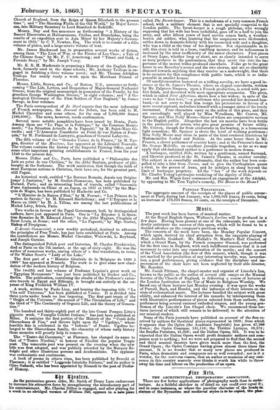S42 tpralus.
As the pantomime grows older, Mr. Smith of Drury Lane endeavours to increase his attractive force by strengthening the introductory part of his entertainment. Mr. Charles Dillon is engaged, and after playing for a week in an abridged version of William Tell, appears in a. new piece called The Forest-keeper. This is a melodrama of a very common French school, with a military element that is not specially congenial to the
London public. The forest-keeper is a rough plebeian, who wrongly
supposing that his wife has been unfaithful, goes off in a huff to join the army, and after fifteen years of hard service comes back, a weather-
beaten old soldier, who, learning that his suspicions were ill-founded, settles down in dramatic felicity with his reconciled wife and a daughter, who was a child at the time of his departure. Not objectionable in it- self, this story is told in a loose, rambling manner, and its tediousness is increased by the utter inefficiency of the minor characters. First pieces at Drury Lane, whether long or short, are so clearly intended to serve as mere prefaces to the pantomimes, that they never rise into the im- portance of the merest trifles produced elsewhere. Folks go to the great house to see Beverley's scenes and the two clowns, and are so charitably disposed towards anything that they receive as a makeweight, that there is no occasion for that compliance with public taste, which is so indis- pensable in smaller houses.
Of careful execution bestowed on a trifling novelty, we have a good in- stance at the St. James's Theatre, where an elegant comedietta, written by Mr. Palgrave Simpson, upon a French production, is acted with per-
fect finish, and decorated with most appropriate accessories. The piece, which is called First Affections, shows how a fair widow, in spite of the
vows to her " first love,"—a gentleman who preceded her deceased hus- band,—is not sorry to find him resign his pretensions in favour of a more recent aspirant, and solace himself with a younger sister of the lovely inconstant. Four characters carry on the action of this piece, and they are exceedingly well played by Miss Wyndham, Mr. Craven, Mr. Spencer, and Miss Nelly Moore—three of whom are comparative novices to the English public. Altogether the last six months have been fertile in the production of actors, who give great promise of future utility. Mr. Craven, though far from aristocratic in his bearing, is a humourous light comedian ; Mr. Spencer is above the level of walking gentlemen; Miss Nelly Moore may shine in parts of the kind rendered illustrious by Mademoiselles Luther and Dubois. At the same house there is Mr.
Francis, a clever performer of country boys ; and at the Princess's there is Mr. George Melville, an excellent juvenile tragedian, so far as we may apply that old-fashioned epithet to a performer in modern drama.
A burlesque, entitled Dido, written by a gentleman, named Burnand,
and likewise produced at the St. James's Theatre, is another novelty. The subject is so essentially undramatic, that the author has been com-
pelled to take a hint from Norma, and to give the Carthaginian queen a rival, in the person of Anna, and he indulges in slang beyond the limit of burlesque propriety. All the "fun " of the work depends on Mr. Charles Young's grotesque rendering of the dignity of Dido. Mr. and Mrs. Wigan have commenced an engagement at the Adelphi, by appearing in Mr. TOM Taylor's comedy, The House or the Home?


























 Previous page
Previous page